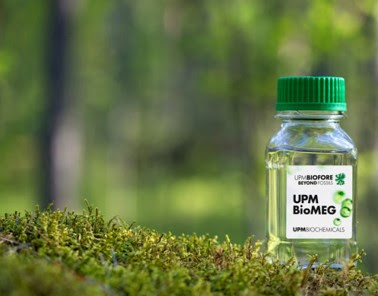UPM invests in a biorefinery to produce biobased chemicals from wood at Leuna
Type of post: NEWS.
UPM enters the biobased chemicals business by
investing in a biorefinery at Leuna (Germany). The biorefinery will produce a
range of 100% wood-based biobased chemicals which will enable a switch from
fossil raw materials to sustainable alternatives in various end applications.
The investment opens totally new markets for UPM with large growth potential
for the future.
Press release: “UPM
invests in next generation biochemicals to drive a switch from fossil raw
materials to sustainable solutions”, 30/1/2020.
Related post: “UPM evaluates building a wood-based
biorefinery to produce green chemicals in Germany”, 25/8/2016.
Figure 1. UPM bio-MEG
In October 2017, UPM
announced that it was evaluating the construction of a wood-based biorefinery
to produce green chemicals in Germany and some preliminary information
about its plans was unveiled. Yesterday, the Finish company confirmed its intention
of investing in that project aimed at creating a totally new sustainable
business in biochemicals with large growth potential. A combination of
sustainable wood supply, unique technology concept, integration into existing
infrastructure at Leuna as well as the proximity to customers will ensure
competitiveness of operations. The safety and sustainability of the value chain
will be based on UPM’s high standards.
Location
|
Chemical
Site Leuna close to Halle-Leipzig.
InfraLeuna
GmbH, in the state of Saxony-Anhalt, offers very competitive conditions for
constructing a biorefinery with its existing permitting processes, logistics
arrangements and infrastructure for various services and utilities.
[Note: Chemical
Park Frankfurt-Höchst was pointed out as potential location in a previous press
release.]
|
Feedstock
|
Wood
sourcing will be based on forest thinnings and residues of regional sawmills.
Availability
of sustainably sourced hardwood in the region is good.
|
Products
and production capacity
|
-
Bio-monoethylene glycol (bio-MEG) and bio-monopropylene glycol (bio-MPG).
Application areas for bio-MEG include
textiles, PET bottles, packaging and deicing fluids. Bio-MPG is used for
example in composites, pharma, cosmetics and detergents. The global glycols
market represents more than 30 Mtons in size and is expected to grow annually
approximately by 4%.
- Lignin-based
renewable functional fillers.
They are used in different rubber
applications as a sustainable alternative to carbon black and silica. The
global market for carbon black and silica combined is more than 15 million
tonnes with an expected annual growth of approximately 3%. Besides climate
benefits UPM’s new renewable functional fillers will provide additional
benefits such as lighter weight and high purity.
|
Production capacity
|
220,000
metric tons per year.
[Note: 150,000
metric tons per year was pointed out as target capacity in a previous press
release.]
|
Investment
|
550 M€.
Following the decision UPM increases the
estimate for total capital expenditure in 2020 to 1,300 M€.
|
Timeline
|
- The engineering and planning is on-going.
- The tendering for the main equipment,
recruitment for the project and permitting process will start immediately.
- Permitting will proceed parallel to the
investment project in line with German legislation.
- Start-up: End of 2022.
- Once the facility is fully ramped up and
optimized, it is expected to achieve the ROCE target of 14%.
|





